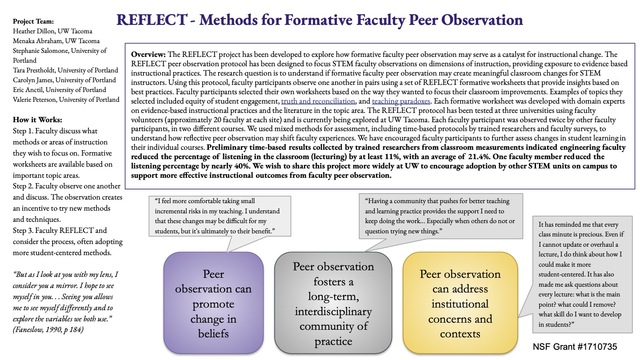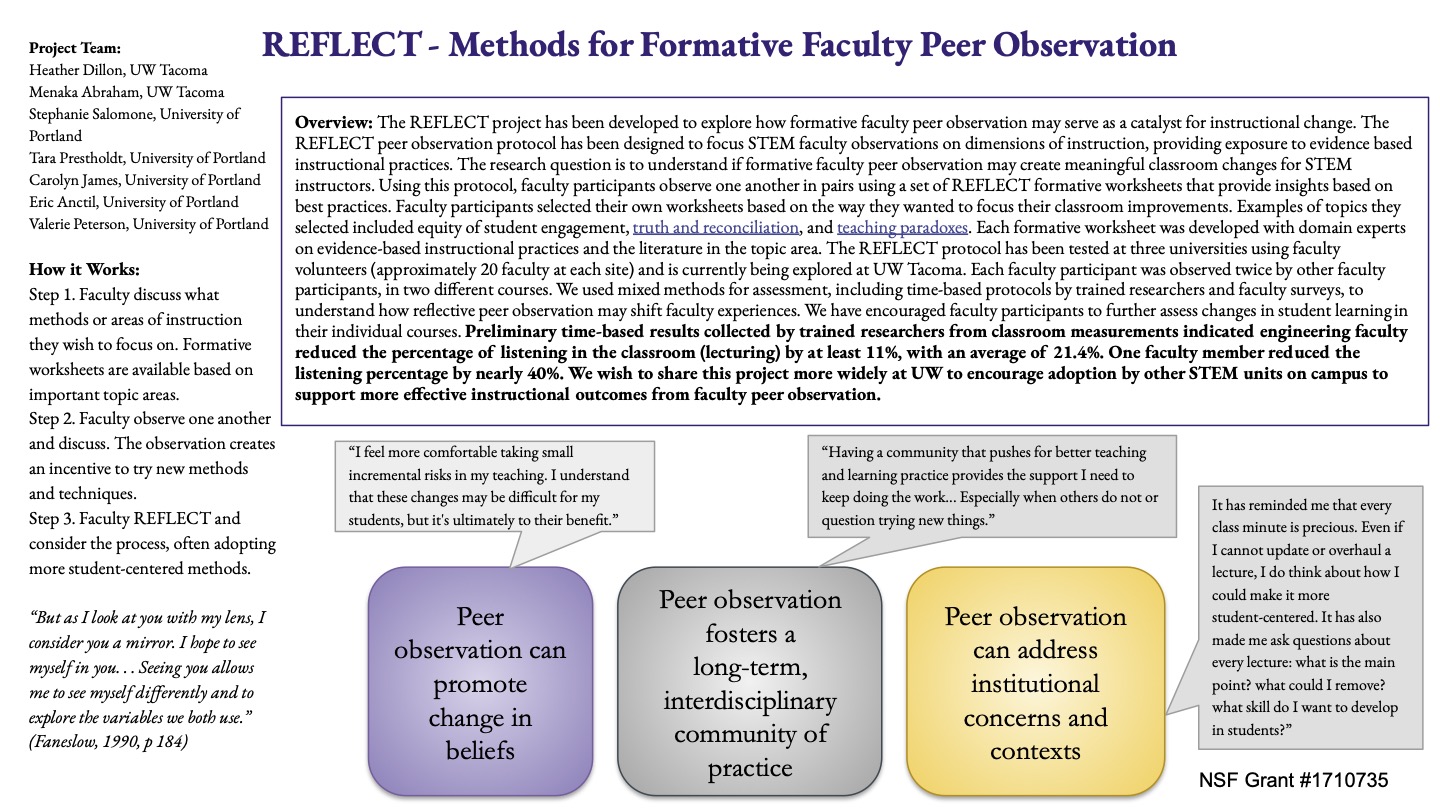Skip to main contentResource added 
Using this protocol, faculty participants observe one another in pairs using a set of REFLECT formative worksheets that provide insights based on best practices. Faculty participants selected their own worksheets based on the way they wanted to focus their classroom improvements. Examples of topics they selected included equity of student engagement, truth and reconciliation, and teaching paradoxes. Each formative worksheet was developed with domain experts on evidence-based instructional practices and the literature in the topic area.
The REFLECT protocol has been tested at three universities using faculty volunteers (approximately 20 faculty at each site) and is currently being explored at UW Tacoma. Each faculty participant was observed twice by other faculty participants, in two different courses. We used mixed methods for assessment, including time-based protocols by trained researchers and faculty surveys, to understand how reflective peer observation may shift faculty experiences. We have encouraged faculty participants to further assess changes in student learning in their individual courses. Preliminary time-based results collected by trained researchers from classroom measurements indicated engineering faculty reduced the percentage of listening in the classroom (lecturing) by at least 11%, with an average of 21.4%. One faculty member reduced the listening percentage by nearly 40%. We wish to share this project more widely at UW to encourage adoption by other STEM units on campus to support more effective instructional outcomes from faculty peer observation.
REFLECT - Methods for Formative Faculty Peer Observation

Full description
Video Presentation
Authors:
- Menaka Abraham, School of Engineering and Technology, UW Tacoma
- Heather Dillon, School of Engineering and Technology, UW Tacoma
Abstract:
The REFLECT project has been developed to explore how formative faculty peer observation may serve as a catalyst for instructional change. The REFLECT peer observation protocol has been designed to focus STEM faculty observations on dimensions of instruction, providing exposure to evidence based instructional practices. The research question is to understand if formative faculty peer observation may create meaningful classroom changes for STEM instructors.Using this protocol, faculty participants observe one another in pairs using a set of REFLECT formative worksheets that provide insights based on best practices. Faculty participants selected their own worksheets based on the way they wanted to focus their classroom improvements. Examples of topics they selected included equity of student engagement, truth and reconciliation, and teaching paradoxes. Each formative worksheet was developed with domain experts on evidence-based instructional practices and the literature in the topic area.
The REFLECT protocol has been tested at three universities using faculty volunteers (approximately 20 faculty at each site) and is currently being explored at UW Tacoma. Each faculty participant was observed twice by other faculty participants, in two different courses. We used mixed methods for assessment, including time-based protocols by trained researchers and faculty surveys, to understand how reflective peer observation may shift faculty experiences. We have encouraged faculty participants to further assess changes in student learning in their individual courses. Preliminary time-based results collected by trained researchers from classroom measurements indicated engineering faculty reduced the percentage of listening in the classroom (lecturing) by at least 11%, with an average of 21.4%. One faculty member reduced the listening percentage by nearly 40%. We wish to share this project more widely at UW to encourage adoption by other STEM units on campus to support more effective instructional outcomes from faculty peer observation.
Poster PDF
View a PDF version of the poster in Google Drive to enlarge the image or download a copy.
Comments
The presenter for this poster will be available to respond to comments during Poster Session 1 on April 20, 2:00-2:50 p.m.Comments
to view and add comments.
Annotations
No one has annotated a text with this resource yet.
- typeImage
- created on
- file formatjpg
- file size425 kB
- publisherUniversity of Washington
- rights


